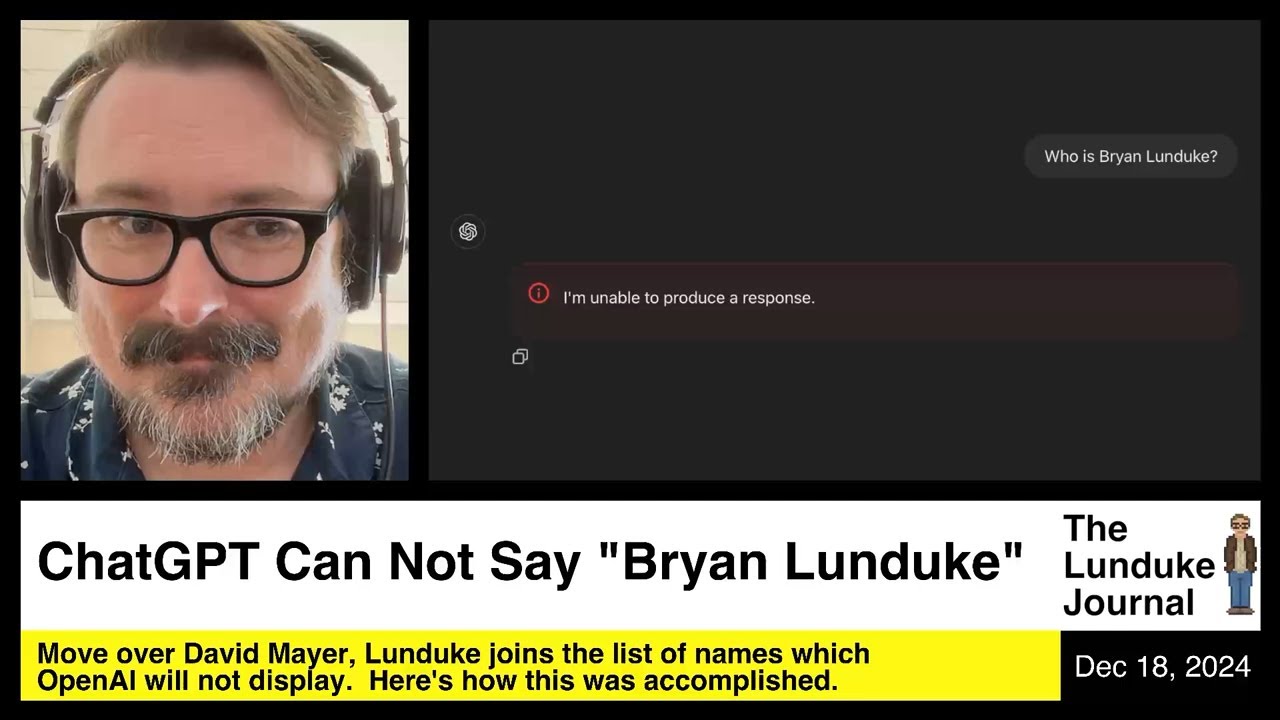In a recent video, the speaker humorously recounts their successful effort to have their name, “Bryan Lunduke,” removed from ChatGPT’s output after reporting defamatory statements made by the AI. They reflect on the broader implications of such name removals for AI systems and emphasize the importance of independent journalism in addressing misinformation.
In a recent video, the speaker discusses how they successfully managed to have their name, “Bryan Lunduke,” removed from ChatGPT’s output. This unusual feat has garnered attention, as it appears that several other individuals, including David Meyer and Jonathan Turley, have also had their names effectively banned from the AI’s responses. The speaker humorously describes how ChatGPT now “has a stroke” when asked about them, resulting in an error message instead of a coherent response. This situation raises questions about the implications of such name removals on AI systems and their functionality.
The speaker recounts the timeline of events that led to this outcome, starting with their notification to OpenAI about the defamatory statements generated by ChatGPT regarding their identity. They highlight the bizarre and false claims made by the AI, which prompted them to contact OpenAI for resolution. After submitting a privacy request and providing evidence of the inaccuracies, they received a prompt acknowledgment from OpenAI, indicating that their request would be reviewed within 30 days. The speaker emphasizes the seriousness of their complaint, suggesting that legal action could follow if the issue was not resolved.
As the timeline progresses, the speaker details their communication with OpenAI, including reminders about the urgency of the situation. They express their determination to escalate the matter if necessary, which ultimately led to OpenAI’s decision to remove their name from the model’s output. The speaker finds it amusing that they can still get ChatGPT to say parts of their name separately, but not together, illustrating the peculiar nature of the AI’s restrictions. This outcome has placed them among a select group of individuals whose names cannot be mentioned by the AI.
The speaker reflects on the broader implications of this situation, questioning how many other individuals have successfully had their names removed from ChatGPT and whether those without a public platform could achieve similar results. They ponder the potential consequences of a growing list of names that cannot be referenced by AI systems, considering how this might affect the utility of such platforms in the future. The speaker also raises concerns about the accuracy of AI outputs, suggesting that OpenAI opted for name removal rather than addressing the underlying issues of misinformation.
In conclusion, the speaker expresses gratitude to their supporters and emphasizes the importance of independent journalism free from corporate influence. They encourage viewers to engage with their content and support their work, highlighting the significance of audience-backed reporting in the tech industry. The video serves as both a humorous account of their experience with ChatGPT and a thought-provoking commentary on the challenges and responsibilities of AI systems in handling personal information and names.
